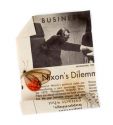Beyer’s book offers broad discussions more than new data or highly focused arguments; despite some arcane and fascinating discussions of magic stones and sex with plant spirits, I suspect that ethnobotanists and anthropologists familiar with the Amazon will find relatively few surprises. But the ant hills of detail are not the point. Singing to the Plants is designed to inform a wider audience–and gently bust some myths–by presenting this almost literally kaleidoscopic phenomenon through a number of distinct lenses: anthropology, ethnobotany, pharmacology, psychology, international law, cultural politics, and magic both crafty and occult. [ read more ]
This fascinating and illuminating essay was one of four articles devoted to “The Herb Dangerous” that ran in the first volume of The Equinox, a review devoted to “Scientific Illuminism” that was edited by the notorious Aleister Crowley early in the 20th century. Arguing that hashish helps “roll away the stone” from the deeper dimensions of both ceremonial magic and Buddhist meditation, Crowley identifies three main effects of the drug. [ read more ]
Despite some issues with the nitty-gritty details, DeKorne’s book belongs alongside Terence McKenna’s i>True Hallucinations and D.M. Turner’s The Essential Psychedelic Guide as one of the best books to emerge from the psychedelic florescence of the early 1990s. [ read more ]
By the time the poet, plant alchemist, and sometimes computer programmer Dale Pendell published his mammoth three-volume Pharmako trilogy this last decade, the world had seen at least a century of texts attempting to squeeze spiritual insight and religious correlates out of psychoactive experience. Pendell, however, managed to write a work of erudition and imagination that was not only strikingly original, but also wise. Whipper-snappers would do well to study the content of these great books, along with their form—a patchwork of citations and lore and lyric flights that express the multidimensional quality of psychoactives themselves. [ read more ]
Delusions of Normality is one of those gifts that does a lot of heavy lifting for you—now you don’t have to read all the newspapers, books, and sociological sources Harpignies uses to gather facts, or at least patterns, that deconstruct mainstream assumptions about the depth and breadth of kinkiness or graft or drug gobbling in American life. [ read more ]
Klea grew up in the swirling penumbra of Terence’s peculiar shadow, and, like many children of famous and colorful folk, had to consciously define her own creative voice apart from her father’s world. In its first, gallery iteration, The Butterfly Hunter did not mention her father’s name, because she wanted the work to stand on its own merit. It is a mark of her courage that her book takes on Terence’s legacy, and a mark of her success that she does it with such candor and care. [ read more ]
The cover of a recent Time magazine special issue features a crafty-looking yoga-babe sitting in padmasana alongside the headline: How Your Mind Can Heal Your Body. It’s just another sign of a sea change in the mainstream representations of mind, as new psychoactives, imaging technologies, and pop spirituality recontextualize the neural dance of consciousness and flesh. The boundaries between ... [ read more ]
There are two dominant attitudes toward modernity inside contemporary drug culture, and both of them, in almost diametrically opposed ways, attempt to slip outside of our history, that engulfing tsunami of politics and commodities, technology and cultural memes that make up the West. On the one hand you have the romantic turn ... [ read more ]









